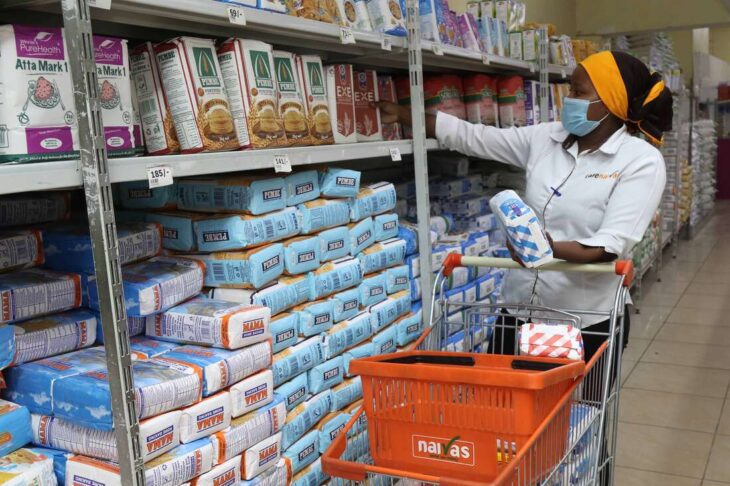NAIROBI, Kenya, Jul, 21 – “Maize flour shall retail across the entire territory of the Republic of Kenya at the price of Sh100, down from Sh205 for a 2kg packet, until otherwise directed,” aid president Uhuru Kenyatta.
The announcement by the president came as a reprieve to millions of Kenyans struggling to make ends meet amid the high cost of living in the country.
Kenyatta had expressed regret that several factors were to blame for the soaring prices of basic commodities.
“I note with regret that the cost of a 2 kg pack of maize-meal remains out of reach for many, as it is currently retailing at an average of Sh205,”
Despite the good news, however, retailers have expressed concern that they will be forced to clear their existing stocks by selling unga at high prices.
The Retail Trade Association of Kenya (Retrak) is seeking to be reimbursed Sh175 million that they paid to maize millers for maize flour supplies at high prices before they start selling it at the government-subsidized prices.
“While the new price tags are affixed, our analysis indicates that as of the close of business on July 20, 2022, retailers affiliated with Retrak were holding unsold stocks amounting to more than 750 tonnes,” said Retrak Chief Executive Wambui Mbarire.
Retailers are said to be holding maize flour stock of 750 tonnes that were purchased at the high market prices.
Talks are said to be ongoing between the two amid a consensus on the way forward.
“We are optimistic that the engagements will bear fruit, and retailers will recover these amounts as rebates or credit notes to facilitate smooth service delivery to our esteemed customers,” said Mbarire.
The global supply chain of food and farm inputs is said to have forever been affected by various factors including prolonged drought, the COVID-19 pandemic, a locust invasion and most recently, the Ukraine-Russia war whose effects continue to be felt.
In the country, however, it is the price of Unga that has the country concerned after it skyrocketed to a record Sh207 at retail stores nationwide.
The rising cost of the basic commodity has almost always been linked to an election cycle, as observers say, just like clockwork, the issue has been used by politicians to woo voters, and this time around, things are not different.
President Uhuru Kenyatta Wednesday at State House Nairobi sought to dissect the matter addressing the high cost of living to the political culture in the country. Before that, however, he reiterated the role of stakeholders such as maize millers, corporate citizens, and even the government of their social responsibilities to the citizens.
“Let me begin by stating a pattern I have observed in our country. Every election in this country has attracted ‘Unga Crisis’. In fact, there seem to be an engineered connection between elections and the high prices of unga. There is an obvious trend between the manner the price of unga goes up and the tempo taken by the election. Why do I say so?,” posed the president.
In three election cycles from 2013 to 2022, Kenyatta said that the price of Unga has almost always shot up creating a sense of social unrest among citizens.
In July 2012, months before the March 2013 election, the price of a packet of 2 Kilogrammes of Unga shot up from Sh70 to Sh130.
In May 2017, three months before the August 2017 election, the price of unga shot up to an unprecedented high of Sh189.
“This is the highest price experienced between independence and 2017. And this crisis was used as the fuel that powered the ambitions of certain members of the political class,” said Kenyatta.
Kenyatta raised suspicion about whether the move was a coincidence, alluding to a deliberate attempt by some stakeholders to cause strife among Kenyans.
“Today, months to the August 2022 election, the price of unga has shot up again. It has moved from a price that is affordable of Ksh 100 to Ksh 205. So the national question we must pose from this trend is this: Is it a coincidence that we have ‘Unga Crisis’ just before every election? Is this the result of a market dynamic or is it a deliberate outcome?,”
Kenyatta faulted politicians for using the issue to capitalize on the misery of Kenyans terming it as unfortunate and distasteful since it exploited the vulnerable in society.
He further challenged his detractor to instead provide solutions.
“And I say so because if one of them acts unethically by hoarding their products, the other benefits by politicizing this irresponsibility. But in the meantime, who suffers from this mischief? If the politician gets his votes out of it and the miller gets their profit, what does the common mwananchi get? And in the end, who carries the burden of this mischief? The common mwananchi, of course!,”
As he called on politicians to exercise civic responsibility, the president also called on millers to practice a reasoned level of social ethics while in their quest to make profits.
Some large-scale commodity houses and maize traders, maize millers, and fuel handlers have been accused of using the practice of hoarding to control prices.
The government has now rolled out several fiscal measures focused on food subsidy aimed at covering t supply and distribution of the country’s staple food, maize meal nationwide.
My Administration has engaged all milling companies registered by Agricultural and Food Authority (AFA), and issued a Legal Notice under the hand of the Cabinet Secretary for the National Treasury. Through this notice, and effective immediately: The Railway Development Levy (RDL) on all imported Maize stands suspended and the Import Declaration Fee (IDF) on all imported Maize is hereby suspended,” said Kenyatta.
Maize flour will now retail nationwide at the price of Sh100, down from Sh205 for a 2kg packet.
Want to send us a story? Contact Shahidi News Tel: +254115512797 (Mobile & WhatsApp)


